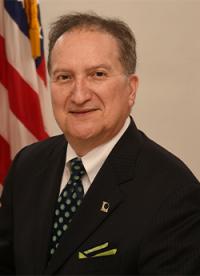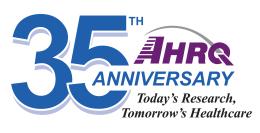AHRQ Views: Blog posts from AHRQ leaders
Continuing a 35-Year History, AHRQ Pursues Vital Pathways to Improve Patient Care
MAY
16
2024
Not long ago, Health and Human Services (HHS) Deputy Secretary Andrea Palm visited AHRQ to update agency staff on HHS priorities and discuss healthcare topics ranging from the future impacts of artificial intelligence to the nation’s mental health crisis.

It was also an opportunity to continue our celebration of AHRQ’s 35th anniversary—not only to recognize the agency’s past contributions, but also to affirm its enormous potential to contribute insights through the three intertwining scientific pathways essential for medical progress and better care.
The theme of our 35th anniversary celebration is “Today’s Research, Tomorrow’s Healthcare.” As I’ve told my colleagues, we must redouble our efforts to improve healthcare not only in 2024 but also in the decades ahead. AHRQ fuels research and development in the healthcare industry. Now is the time to plant the seeds for healthcare systems to thrive today and in the future.
As we advance AHRQ’s scientific agenda to transform healthcare to meet consumers’ demands, we are mindful of the agency’s role among the three intertwining pathways: biomedical research, technology assessment, and health services research. Technology assessment and health services research are essential to inform clinical learning and care organization and delivery. AHRQ’s creation as an independent science agency authorized the latter two pathways to achieve its unique federal mission of improving healthcare in our nation.
Our colleagues at the National Institutes of Health lead the way globally in biomedical research, which is the critical first step in generating fundamental knowledge about the nature and behavior of living systems and a greater understanding of disease pathologies. These bedrock scientific discoveries inform the development of many of today’s medications and other patient therapies.
AHRQ, in turn, plays a leading role in the technology assessment and health services research pathways. Technology assessments examine how new technologies and materials can be introduced to improve current care delivery and treatment protocols. Generative artificial intelligence is a current example that our team has been working on to ensure this new technology safely and reliably contributes to better patient care. Health services research, introduced as an interdisciplinary scientific enterprise in the 1960s, is the modern approach to the historic clinical learning that has taken place for centuries in pursuit of improving care.
We are poised to increase AHRQ’s contributions to improving consumers’ experiences with healthcare in our nation, ensuring that consumers and professionals across the healthcare ecosystem understand scientific evidence from “real-world” settings. The clearest path to achieving that goal is to ensure that “actionable knowledge” is disseminated and implemented through novel clinical insights, tools, and resources that advance clinical practice and the organization and delivery of services.
AHRQ’s track record in the dissemination of “actionable knowledge” is longstanding:
- Since 2001, the agency’s Evidence-based Practice Center Program has developed more than 800 reports summarizing the evidence on medications, devices, and other healthcare services. In 2023 (PDF, 2.7 MB), topics ranged from the impact of algorithms on healthcare disparities to the use of telehealthcare during the COVID-19 era to medications for alcohol use disorder.
- AHRQ’s Making Healthcare Safer Reports are updated continuously to help healthcare providers, health system administrators, researchers, and others understand evidence-based practices to improve safety across patient care settings – an integral element in quality improvement. The report’s recent fourth edition offered guidance on opioid stewardship, reducing adverse events from anticoagulants, and predictions and interventions for sepsis.
- AHRQ’s data collection and analysis initiatives inform our understanding of consumers’ use of healthcare. The Medical Expenditure Panel Survey is the nation’s most complete data source for healthcare costs and use. The Healthcare Cost and Utilization Project provides the most extensive longitudinal data on hospital care. AHRQ’s National Healthcare Quality and Disparities Report provides annual reports on consumers’ access to care, affordability, treatment effectiveness, and patient safety.
 AHRQ resources are essential for health services research, which examines healthcare as it is delivered to patients. Over the past decade, AHRQ has funded more than 12,000 published studies exploring the organization, delivery, and financing of healthcare from the perspectives of patients and their families, clinicians, and providers.
AHRQ resources are essential for health services research, which examines healthcare as it is delivered to patients. Over the past decade, AHRQ has funded more than 12,000 published studies exploring the organization, delivery, and financing of healthcare from the perspectives of patients and their families, clinicians, and providers.
Given the gap between what is achieved and what should be possible in healthcare, strengthening the nation’s capacity to assess health system performance is essential. It also provides the foundation for strategies and tools for high-quality care. Among the resources developed by AHRQ:
- The EvidenceNOW model, initially developed to improve primary care patients’ heart health via practice facilitation and coaching, has been expanded to advance care for women with urinary incontinence, improve screening and treatment for unhealthy alcohol use, and build state capacity to advance equity in heart health.
- TeamSTEPPS®, developed in partnership with the Department of Defense, is a team training curriculum used by healthcare organizations since 2005 to guide hundreds of thousands of professionals in evidence-based patient safety practices. TeamSTEPPS 3.0 is available to keep pace with the rapid changes in healthcare delivery.
- AHRQ implements the Comprehensive Unit-based Safety Program (CUSP) nationwide. This program combines improvements in safety culture, teamwork, and communication to prevent healthcare-associated infections and other patient harms.
- Just last month, the U.S. Preventive Services Task Force used an AHRQ-commissioned evidence review to recommend that all women age 40 years or older be screened for breast cancer every other year, continuing through age 74.
As we advance, reliance on evidence-based information drives AHRQ’s initiatives. HHS’ National Action Alliance for Patient and Workforce Safety, a public-private collaboration convened by AHRQ on behalf of HHS to regain ground lost in patient safety during the pandemic, is seeing results: 85 percent of hospitals have made progress on reducing at least one healthcare-associated infection among the three tracked by The LeapFrog Group, among others. This is a good start, but more work must be done together across the healthcare ecosystem to achieve the goal of a 50 percent reduction in harm by 2026.
In the upcoming weeks, AHRQ will take steps to launch a network of state-based healthcare extension cooperatives to strengthen the capacity of local healthcare systems, other healthcare organizations, and clinicians to reduce the “innovation-to-practice” gap by accelerating the use of “actionable knowledge” and delivering whole-person care.
Transferring the newest and best scientific innovations from the biomedical research setting to clinical teams and, ultimately, patient care delivery is a complex challenge. AHRQ will enthusiastically lead efforts to advance medical progress along these pathways, making today’s research, tomorrow’s healthcare.
Dr. Valdez is director of AHRQ.



